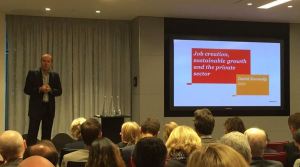On Monday I was the lucky recipient of a last-minute ticket to the PWC International Development Conference when a colleague wasn’t able to attend any more. David Kennedy, the newly appointed Economic Development Director General, gave an impressive-20-minute-no-notes opening address focussing on DFIDs approach to economic development.

David Kennedy speaking at the PWC International Development Conference, 24 November 2014. Source: twitter
He emphasised throughout that DFID are still developing much of their thinking and that they would welcome discussion on this. He ended by saying, “if you have any other questions or thoughts, send me an email, I’d love to engage” – and so, taking this offer at face value, here are my three points:
Firstly, the new DG noted that DFID are in the process of developing a definition for inclusive growth but that inclusion is an important cross-cutting element of their strategy and that part of the inclusion story is about all groups in society having access to jobs (i.e. equal access to opportunities).
I’m very pleased that DFID are developing some concrete thinking around inclusive growth and are doing some work towards defining what this means within the department. There is a need for clear definitions, indicators and targets for inclusive and environmentally sustainable growth. We have produced a discussion paper where we consider some of the aspects necessary within an inclusive growth strategy (see also our previous blogs on this topic) – a jobs strategy as well as economic participation are two key aspects that the literature highlights are important. As DFID are looking for engagement on this topic, they could call a day’s workshop – with business, NGOs, academics and other actors – to look at what thinking has already been done on this and move towards a definition and indicators.
Secondly, David Kennedy noted that transformational economic growth is long-term and that you need an intermediate plan so that you don’t leave people behind.
I agree. However, in DFID’s economic development strategic framework there seems to be a missing link demonstrating how this bigger-picture economic development agenda links with DFID’s current, valuable work targeting the livelihoods of the poorest. In a poll with Monday’s audience, 62% of the room were not convinced that DFID’s focus on the investment climate and ‘catalytic investment’ (two pillars within the economic development strategic framework) was even the right focus. DFID have a strong reputation for their work targeting the poorest; this work needs to be better integrated and reflected in their overarching strategic direction and I’m interested in hearing more about what the intermediate plan for supporting the poorest would look like. Similarly, what steps could be taken to make some of the economic transformation agenda more beneficial to those living in poverty? We have some suggestions, for example, of what work towards a pro-poor business environment would look like (see our Think Small research and a case study we’ve done with our partner, JCTR in Zambia).
Thirdly, the DG made the point that in thinking about economic development, sustainability is important and that economic growth needs to be resilient to the risks that climate change brings.
This point was well made, but hasn’t been a focus for DFID. As we highlighted in a recent submission to the International Development Committee inquiry on ‘beyond aid’, the concept of environmental sustainability is almost completely missing from DFIDs economic development strategy. This is problematic, especially in light of Simon Maxwell’s aptly made point during his closing remarks at the PWC conference that “climate change will be the game-changer” in international development over the next 10 years. As a recent CAFOD paper highlights, “to achieve inclusive growth for maximum poverty impact and an inclusive economy, environmental sustainability is an essential consideration”.
A much more joined-up approach to environmental sustainability is therefore needed. This means that DFID needs to develop a more integrated approach to economic development that has both social and environmental objectives (Our recent papers with IIED looking at the issue of a green and fair economy provide some thoughts on this). Another important step would be for all relevant departments (DFID, DECC, DEFRA, Treasury & FCO) to share a coherent strategic policy framework to ensure government interventions across the board promote climate protection, including supporting poor and vulnerable countries and groups both to adapt to climate change impacts and to build low carbon, socially inclusive development. (Our IDC submission elaborates on these suggestions – see page 10 in particular).
The above three points are some thoughts in response to David Kennedy’s request for engagement. We’d like to take these discussions forward with DFID and to have more opportunities for joint learning. I’d also be interested to hear from others who have thoughts on DFID’s economic development strategy and on their work on inclusion. Please email me, tweet or post your comments below.
Tags: climate change, economics, inclusive growth, sustainability
January 21, 2016 at 5:53 pm |
Would you happen to know how I could contact David Kennedy?
January 25, 2016 at 10:50 am |
Hi there, thanks for getting in touch. Unfortunately I can’t help you on this one. You could need to contact DFID directly. All the best with this, Sarah